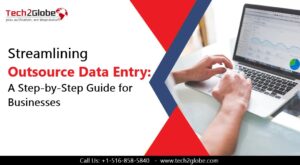Do you know that every year, more than 60% of people change their job title? Even while that number is astounding, if you work in investment sales, you probably aren’t too surprised by it. One of the most challenging components of every salesperson’s work is making the right calls and scheduling meetings. Working with outdated data that lists individuals whose roles, titles, and contact information have changed since you last interacted with them only complicates your job. A CRM is a powerful tool, but it is only as helpful as the data it holds. Then, how should your data be maintained?
What More in Data Management?
There are several options available to you. Would you like to hire a database administrator, integrate it into your sales team’s workflow, or make an effort to complete it yourself? Or do you contract it out to a third party? Everything depends on the requirements of your team. Tech2globe is a data management service provider, therefore it is aware of the market and how long it takes to maintain everything up to date. They recognise your point of view, though, and will inform you that the best course of action requires a third party because that is what we do. We are conscious, nevertheless, that not every company has the same amount of information, personnel, or resources.
This blog post will compare and contrast the benefits and drawbacks of managing your data internally versus hiring an Outsource Data Management Services, third party to do so. By the end of this post, you’ll be able to decide which is best for your team, ensuring that your data is as current as possible.

Maintaining The Potential For Third-Party Data
Regarding third parties, there are numerous alternatives. Both using a third-party database administrator and directly obtaining your data from a third-party database subscription and putting it into your CRM are choices.
1. Database Membership: For a yearly subscription fee, a database membership grants you access to a database of accounts and contacts in the investment industry. These come in a variety of sizes, from lists containing hundreds of thousands of accounts and contacts to smaller lists, and are suited to the needs of the industry. Depending on the database your team chooses data management services, you might still need to verify the data to make sure it is true.
2. Database Administration: These software options will help you keep your data as up to date as possible. These products, offered by companies such as Oracle, SentryOne, and Redgate, are usually built to complement your data team rather than act as a stand-alone solution.
3. Database Efficiency: The benefits of controlling third-party data include better efficiency. You and your team will eventually keep the time that you and your team save by outsource management services USA. The information is already waiting for you; you don’t need to search for a number to contact. This gives your sales team the ability to start making calls and setting up meetings, which leads to the closing of additional deals.
4. Access to large amounts of data: A third-party data management company provides the ability to swiftly pull a large amount of data. As a result, your team won’t have to spend hours doing preparatory research and will have instant access to a variety of knowledge. Databases are especially helpful for large projects, when a company is trying to understand a new market.
The Drawbacks Of Handling Third Party Data
1. Your data may become outdated: if you just rely on third parties or industry sources for it. Your data may also contain outdated contact information. Instead, gather and maintain your own contact information, or establish relationships with people to maintain theirs, which will make it simpler for you to keep it up to date.
2. The data isn’t always exact matched: There is no guarantee that information you get from a third party will be totally accurate. This might mean using a third-party database administration system, or it might entail the need for human intervention to verify the veracity of the data received.
What About The Data That Is Internally Maintained?
The following are some benefits of internal data management:
1. Real-Time Updates: Ensuring that your data is always accurate by designating a team or individual within your business who is completely responsible for data conversion services. When employing a third party or piece of software, there may be delays, especially if you are handling a large amount of data. This can be a huge disadvantage that may cause you to keep things internal in a field where data can quickly become outdated.
2. Dedication And Trust: Using other resources may not always instil the same amount of confidence in the process as hiring document processing services someone who can devote themselves to achieving your company’s aims and objectives.
The Negative Aspects Of Internal Data Management
Making sure that your data is accurate and up to date daily requires a significant amount of time. You might not be able to update as much data in bulk as a system or source from a third party because of the size of your data team.
Conclusion
If you’re looking for a lot of accounts and contacts, a Outsource Data Management Services would be ideal. If you are more focused on a specific channel, it would be wise to subscribe to a smaller, more manageable database that is more specialised and updated. In order to ensure that you are constantly given new, accurate, and up-to-current data, a good compromise is to subscribe to a database and engage an internal data staff to keep it up to date.










